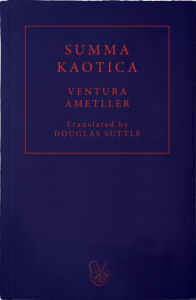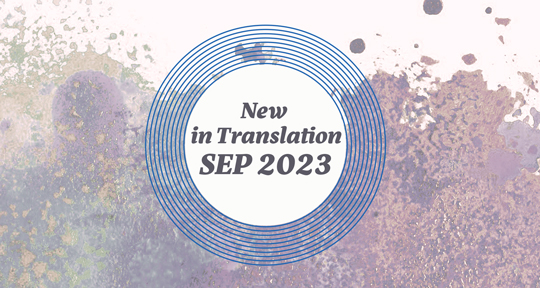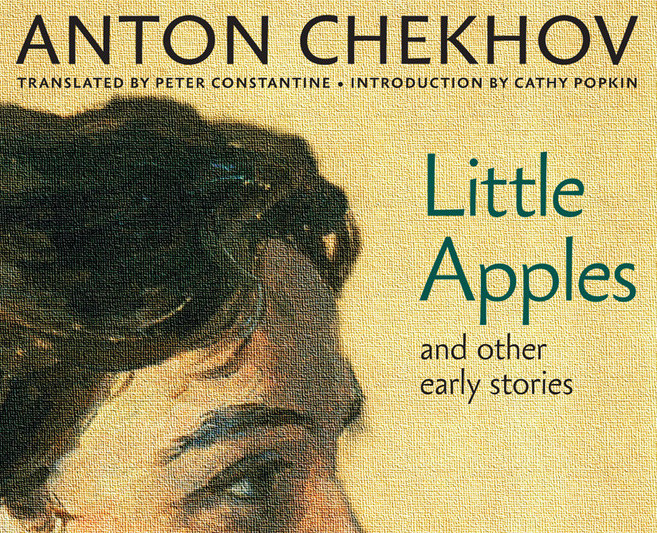This month in newly released translations, we’re featuring two authors of inimitable voice and style. From the Catalan, a surrealist masterpiece by Ventura Ametller sharply blends history with mysticism in an epic retelling of the Spanish Civil War; and from the French, the latest text by Annie Ernaux returns to some of the author’s most central themes—sex and memory—in a poignant examination of corporeal and psychological navigations.

Summa Kaotica by Ventura Ametller (Bonaventura Clavaguera), translated from the Catalan by Douglas Suttle, Fum d’Estampa, 2023
Review by Samantha Siefert, Marketing Manager
A monstrosity of a fish gnashes at a tiger, the tiger leaps towards a gun, the gun is aimed perilously at the prone body of a nude woman. . . It’s all so unexpected and moving, but what do these objects have to do with one another—or with anything at all?
Such is surrealism: the challenge of reconciling the disparity of absurdity. “Everything leads us to believe that there exists a spot in the mind from which life and death, the real and the imaginary, the past and the future, the high and the low, the communicable and the incommunicable will cease to appear contradictory,” declared André Breton in his manifesto. Riding on the coattails of Dadaism, surrealism emerged as an impulsive reaction to the tragedy of the First World War: If reason had resulted in such great suffering, then what good was a movement rooted in realism?
The antithesis of reason, then, was the way forward, and the efforts of the avant-garde were so resonant that they continue to exist today as comfortable figures of popular culture, where the discordance of fish, tiger, and gun feel almost familiar in Salvador Dalí’s famous painting, “The Dream Caused by the Flight of a Bee Around a Pomegranate a Second Before Awakening.” The surrealist world of letters, however, leave room for discovery.
In Catalonia with Dalí at the beginning of the twentieth century, the writer Ventura Ametller—the pen name of Bonaventura Clavaguera—was hard at work, producing a prolific collection of poetry, essays, and novels that turn the world upside down in raucous prose, described by essayist Lluís Racionero as “Dalí in words.” His work has remained only quietly appreciated, but perhaps the time has come for that to change with the new publication of Ametller’s groundbreaking magnum opus, Summa Kaotica, in a masterful translation from the Catalan by Douglas Suttle. READ MORE…




Compass and Rifle: On Roque Dalton’s Stories and Poems of a Class Struggle
No one escapes Dalton’s inquisitive pen . . .
Stories and Poems of a Class Struggle by Roque Dalton, translated from the Spanish by Jack Hirschman, Seven Stories Press, 2023
On Thursday, July 6, 2023, the inaugural day of Guatemala’s International Book Fair (FILGUA), the government of El Salvador requested organizers to exclude Salvadoran author Michelle Recinos’ Sustancia de hígado (F&G Editores) from the fair. The next day, online news outlet elfaro revealed that El Salvador’s ambassador in Guatemala had said, “It would’ve been an unpleasant thing for the government of El Salvador if this book had been a part of the fair.” Details are scarce, but presumably, this action was related to Michelle’s story Barberos en huelga, winner of the 2022 Mario Monteforte Toledo Prize, which openly criticizes sitting president Nayib Bukele’s war on gangs.
Hearing this, I can only imagine what Roque Dalton would have written about Bukele.
Roque Dalton’s Historias y poemas de una lucha de clases (Stories and Poems of a Class Struggle) dates back to 1975, and remains as timely as ever. In a time when most Central American countries are under authoritarian regimes and have experienced backslides of democracy, the life and work of Roque Dalton is at once a beacon of hope, an inspiration, and a warning sign. Historias y poemas de una lucha de clases is a book filled with courageous testimony, the poet’s typical dry humor, and bone-chilling depictions of state violence. Here, Dalton is hyperaware of the pain and plight of his compatriots, but in addition to his typical grittiness and social critique, we also find tenderness, softness, beauty, and frailty; Dalton’s acute perception is both a rifle and a compass, manifesting in words of both rebuke and encouragement.
READ MORE…
Contributor:- José García Escobar
; Language: - Spanish
; Place: - El Salvador
; Writers: - Alaíde Foppa
, - Carlos Fonseca
, - Ernesto Cardenal
, - Jack Hirschman
, - Jaime Barba
, - Julio Delfos Marín
, - Luis de Lión
, - Luis Melgar Brizuela
, - Margaret Randall
, - Michelle Recinos
, - Otto René Castillo
, - Roque Dalton
; Tags: - authoritarianism
, - Central American literature
, - class struggle
, - elfaro
, - F&G Editores
, - fascism
, - FILGUA
, - Mario Monteforte Toledo Prize
, - Salvadoran literature
, - Salvadoran poetry
, - Seven Stories Press
, - social commentary
, - social critique
, - state violence